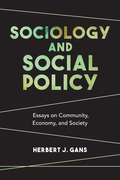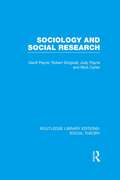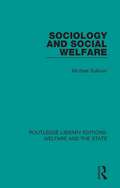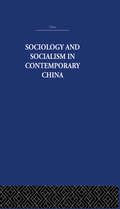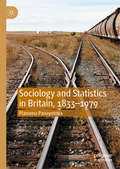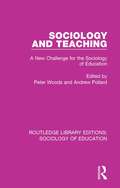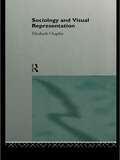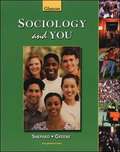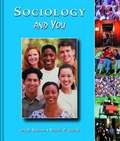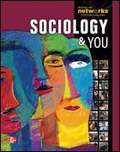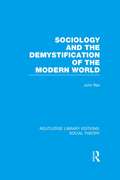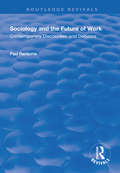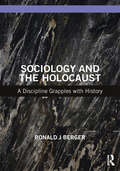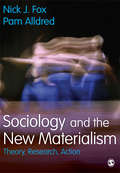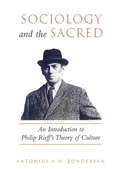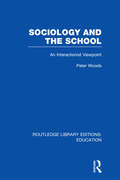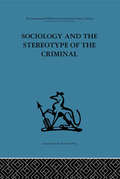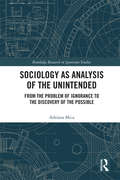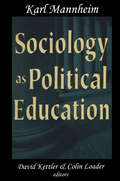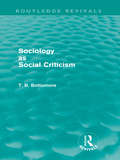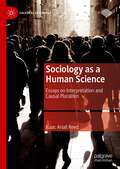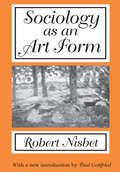- Table View
- List View
Sociology and Social Policy: Essays on Community, Economy, and Society
by Herbert J. GansThis collection of recent essays by the influential sociologist Herbert J. Gans brings together the many themes of Gans’s wide-ranging career to make the case for a policy-oriented vision for sociology. Sociology and Social Policy explicates and helps solve social problems by presenting a range of studies on what people, institutions, and social structures do with, for, and against one another. These works from across Gans’s areas of interest—the city, poverty, ethnicity, employment and political economy, and the relationship between race and class—together make a powerful call to action for the field of sociology.
Sociology and Social Research (Routledge Library Editions: Social Theory)
by Robert Dingwall Geoff Payne Judy Payne Mick CarterA social science which has become so remote from the society which pays for its upkeep is ultimately doomed, threatened less by repression than by intellectual contempt and financial neglect. This is the message of the authors of this book in this reassessment of the evolution and present state of British sociology. Their investigation analyses the discipline as a social institution, whose product is inexorably shaped by the everyday circumstances of its producers; it is the concrete outcome of people’s work, rather than a body of abstract ideas. Drawing upon their varied experience as teachers and researchers, they identify three major trends in contemporary sociology. First, that the discipline’s rapid expansion has led to a retreat from rigorous research into Utopian and introspective theorising. Second, that the concept of sociological research is being taught in a totally false way because of this, and encourages ‘research’ within a wholly academic environment. Third, that the current unpopularity of sociology with academics, prospective students and politicians is no coincidence, but a reflection of the conditions under which sociology is now produced and practised. In Sociology and Social Research the authors suggest substantial changes in sociological research, the way in which it is carried out and the conditions under which it is undertaken. Their book is a timely warning to fellow sociologists when the profession is under attack as a result of public expenditure cuts.
Sociology and Social Welfare (Routledge Library Editions: Welfare and the State #19)
by Michael SullivanOriginally published in 1987, Sociology and Social Welfare looks at the relationship between state and welfare in the context of a wider sociological analysis of state and society in post-war Britain. The book looks at two main concerns, the first suggests the ways in which the theory and practice of welfare might be made more reflective and self-conscious if located in sociological understandings of state, society, and welfare. The second suggests that the sociological study of social work and other welfare activities might lead to the development of a more sensitive and practice-informed sociology.
Sociology and Socialism in Contemporary China
by Siu-lun WongFirst published in 1979. Sociology flourished in China during the 1930s and 1940s but with the establishment of the People's Republic of China, controversies arose over the place of sociology in the process of socialist construction. Siu-lun Wong analyses the reasons for this change in the fortune of sociological studies in China and examines it in relation to the country's contemporary political system.
Sociology and Statistics in Britain, 1833–1979
by Plamena PanayotovaAt the beginning of the twentieth century, Britain stood at the forefront of science and statistics and had a long and respected tradition of social investigation and reform. But it still did not yet have a ‘science of society.’ When, in the early 1900s, a small band of enthusiasts got together to address this situation, the scene was set for a grand synthesis. No such synthesis ever took place and, instead, British sociology has followed a resolutely non-statistical path. Sociology and Statistics in Britain, 1833-1979 investigates how this curious situation came about and attempts to explain it from an historical perspective. It uncovers the prevalence of a deep and instinctive distrust within British sociology of the statistical methodology and mindset, resulting in a mix of quiet indifference and active hostility, which has persisted from its beginnings right up to the present day. While British sociology has thrived institutionally since the post-war expansion of higher education, this book asks whether or not it is poorer for having failed to recognise that statistics provides the foundations for the scientific study of society and for having missed opportunities to build upon those foundations. Ultimately, this important, revealing and timely book is about British sociology’s refusal to come to grips with a modern scientific way of thinking which no discipline that aspires to an effective study of society can afford to ignore.
Sociology and Teaching: A New Challenge for the Sociology of Education (Routledge Library Editions: Sociology of Education #61)
by Andrew Pollard Peter WoodsFirst published in 1988, this work considers the ways in which the sociology of education can inform educational practice. It examines the research which marries the two fields and considers the thinking behind it. It addresses key themes such as: sociological awareness or imagination, and how it might be stimulated and enriched by educational study; reflectivity for both teachers and sociologists; and ethnography, the major research orientation behind most of these studies.
Sociology and Visual Representation
by Elizabeth ChaplinFirst published in 2004. Routledge is an imprint of Taylor & Francis, an informa company.
Sociology and You
by Jon M. Shepard Robert W. GreeneA sociology program written exclusively for high school students, Sociology and You is written by successful authors with extensive experience in the field of sociology. Meet American Sociological Association standards for the teaching of sociology in high school with this comprehensive program.
Sociology and You
by Shepard GreeneA book that enables you to see a connection between the social forces around you and your own life.
Sociology and You (NTC: Sociology and You Ser.)
by Jon M. ShepardTrusted authorship communicates the theory and application of sociology principles in understandable, age-appropriate language. The student edition is built around the educational philosophy of Understanding by Design and Essential Questions.
Sociology and the Demystification of the Modern World (Routledge Library Editions: Social Theory)
by John RexProfessor Rex’s controversial book concerns not only those who are professional sociologists but all thinking people who live in the modern world. One of the objects of sociology is to give ‘power to the people’, to make a contribution to the understanding of political problems. Rex writes from a deep conviction that sociology is a subject whose insights should be made available to the great mass of the people, so that they may liberate themselves from the mystification of social reality that is continually and routinely presented to them through the media, by those who exercise power and by those who have influence. The book is dedicated to St Augustine and Franz Fanon, both of whom, Rex points out, were conscious of living in an age which was embarking on a new barbarism, but had the courage to use their intellects to help understand the possibility of a better future. Rex continues in this tradition, and his main preoccupations are reflected in the present book. It includes a discussion of the problem of social knowledge, an analysis of the basic problems of theory building, and, with the aid of concepts derived from Max Weber, an attempt to understand the major problems of the first, second and third worlds. The author also looks at social structures and moral perspectives, and discusses the vocation of a sociologist in a collapsing civilisation. The book is certain to stimulate debate, both in sociological and political fields and more generally, and is also a serious contribution to the discussion of the methodology and purposes of sociology.
Sociology and the Future of Work: Contemporary Discourses and Debates (Routledge Revivals)
by Paul RansomeFirst published in 1999, this book adopts an explicitly forward-looking and dynamic approach in trying to understand not only where the sociology of work has come from but of where it is likely to go next. For the first time in a single volume, it reviews the continuing usefulness of the 'classical' accounts of Karl Marx, Max Webster and Emile Durkheim, the post-industrial accounts of the 1960s and 1970s and the post-Fordist accounts of the 1980s and 1990s. It provides specific treatment of key topics such as technological change and 'flexibility', the impact of gender on work, the changing nature of the relationship between work and personal identity and the possible emergence of economic globalization, all of which are currently receiving much academic and popular attention. The treatments of gender, identity and globalization are challenging and innovative in that they go beyond simply describing current debates, and question the validity of some of the premises on which they are based. For example, that it is not possible to provide a 'unifying' explanation of gender inequality at work because its causes are multiple rather than singular; that it is wrong to imply that work will cease to be an important basis of personal identity; and that evidence of economic globalization is far too patchy to justify the claim that we are living in a 'global economy.' The text combines theoretical analysis with clear descriptions of the key arguments and tests these against current empirical data.
Sociology and the Holocaust: A Discipline Grapples with History
by Ronald J BergerFor some time the conventional wisdom in the interdisciplinary field of Holocaust studies is that sociologists have neglected this subject matter, but this is not really the case. In fact, there has been substantial sociological work on the Holocaust, although this scholarship has often been ignored or neglected including in the discipline of sociology itself. Sociology and the Holocaust brings this scholarly tradition to light, and in doing so offers a comprehensive synthesis of the vast historical and social science literature on the before, during, and after of the Holocaust—a tour d’horizon from an explicitly sociological perspective. As such, the aim of the book is not simply to describe the chronology of events that culminated in the deaths of 6 million Jews but to draw upon sociology’s “theoretical toolkit” to understand these events and the ongoing legacy of the Holocaust sociologically.
Sociology and the Holocaust: A Discipline Grapples with History
by Ronald J BergerFor some time the conventional wisdom in the interdisciplinary field of Holocaust studies is that sociologists have neglected this subject matter, but this is not really the case. In fact, there has been substantial sociological work on the Holocaust, although this scholarship has often been ignored or neglected including in the discipline of sociology itself. Sociology and the Holocaust brings this scholarly tradition to light, and in doing so offers a comprehensive synthesis of the vast historical and social science literature on the before, during, and after of the Holocaust—a tour d’horizon from an explicitly sociological perspective. As such, the aim of the book is not simply to describe the chronology of events that culminated in the deaths of 6 million Jews but to draw upon sociology’s “theoretical toolkit” to understand these events and the ongoing legacy of the Holocaust sociologically.
Sociology and the New Materialism: Theory, Research, Action
by Nick J. Fox Dr Pam AlldredThe first book of its kind, Sociology and the New Materialism explores the many and varied applications of “new materialism,” a key emerging trend in 21st century thought, to the practice of doing sociology. Offering a clear exposition of new materialist theory and using sociological examples throughout to enable the reader to develop a materialist sociological understanding, the book: Outlines the fundamental precepts of new materialism Explores how materialism provides new perspectives on the range of sociological topic areas Explains how materialist approaches can be used to research sociological issues and also to engage with social issues. Sociology and the New Materialism is a clear and authoritative one-stop guide for advanced undergraduates and postgraduates in sociology, cultural studies, social policy and related disciplines.
Sociology and the New Materialism: Theory, Research, Action
by Nick J. Fox Pam AlldredThe first book of its kind, Sociology and the New Materialism explores the many and varied applications of "new materialism," a key emerging trend in 21st century thought, to the practice of doing sociology. Offering a clear exposition of new materialist theory and using sociological examples throughout to enable the reader to develop a materialist sociological understanding, the book: Outlines the fundamental precepts of new materialism Explores how materialism provides new perspectives on the range of sociological topic areas Explains how materialist approaches can be used to research sociological issues and also to engage with social issues. Sociology and the New Materialism is a clear and authoritative one-stop guide for advanced undergraduates and postgraduates in sociology, cultural studies, social policy and related disciplines.
Sociology and the Sacred: An Introduction to Philip Rieff's Theory of Culture
by Antonius A.W. ZondervanThe acclaimed American sociologist and cultural philosopher Philip Rieff gained great academic prestige with his thesis on the emergence of 'Psychological Man' in western culture and with his classic book, Freud: The Mind of the Moralist, published in 1959. In this work and the later The Triumph of the Therapeutic (1966) he not only offered a highly original interpretation of the work of Sigmund Freud, but critically evaluated the enormous influence of psychotherapeutic thinking on Western culture. However, Rieff's later work on the theory of culture did not garner the same attention, and his most recent writings have received very little critical engagement. In Sociology and the Sacred, Antonius A.W. Zondervan sets out to remedy this neglect, arguing that Rieff's work is ripe for intellectual reconsideration. Zondervan begins by presenting an outline of Rieff's entire body of work, focusing on his theory of culture, and explaining how the sacred is a key notion, pivotal to the overall understanding of Rieff's work. The author argues that the present upsurge in religion, in many varieties throughout the world, cannot be explained by the classical secularization thesis, making Rieff's theory of sacred order in culture an essential contribution to a new social theory of religion. Including material from personal interviews with Rieff that enabled Zondervan to clarify important aspects of his work, Sociology and the Sacred is an essential contribution to the understanding of contemporary culture's maintenance of its ties to religion.
Sociology and the School (Routledge Library Editions: Education)
by Peter WoodsThis is an introduction to interactionist work in education during the 1970s and 80s. The interactionist viewpoint concentrates on how people construct meanings in the ebb and flow of everyday life – what they think and do, how they react to one another – and has in recent years established itself as one of the leading approaches in education. It has generated illuminating research studies which, by being firmly based in the real world of teaching and dealing with the fine-grained details of school life, have helped to break down the barriers between teacher and researcher. This volume presents the results of this valuable work, within a coherent theoretical framework, by focusing on the major interactionist concepts of situation, perspectives, cultures, strategies, negotiation and careers. By bringing them together in this way, the author demonstrates their collective potential for the deeper understanding of school life and the possibilities for sociological theory. His book therefore offers both a summary of and a reflection on achievement in the area of interactionism as it relates to schools.
Sociology and the Stereotype of the Criminal
by Dennis ChapmanTavistock Press was established as a co-operative venture between the Tavistock Institute and Routledge & Kegan Paul (RKP) in the 1950s to produce a series of major contributions across the social sciences. This volume is part of a 2001 reissue of a selection of those important works which have since gone out of print, or are difficult to locate. Published by Routledge, 112 volumes in total are being brought together under the name The International Behavioural and Social Sciences Library: Classics from the Tavistock Press. Reproduced here in facsimile, this volume was originally published in 1968 and is available individually. The collection is also available in a number of themed mini-sets of between 5 and 13 volumes, or as a complete collection.
Sociology as Analysis of the Unintended: From the Problem of Ignorance to the Discovery of the Possible (Routledge Research in Ignorance Studies)
by Adriana MicaSociology of unintended consequences is commonly depicted as a framework for understanding the outcomes that run counter to the initial intentions of social actors because of factors such as ignorance, error and complexity. This conventional approach, however, is now undergoing change under the influence of more encompassing shifts in framing in social sciences. Indeed, in the last few years, the study of the unintended has evidently moved from the question "What are the sources of the unintended?" to the inquiry "What is it that makes the unintended possible?" or "What risks, but also opportunities, do the unintended entail?" Explaining this puzzle in relation to the internal dynamics of sociology of unintended consequences, Adriana Mica makes an erudite journey in relation to its three main analytical frameworks, their semantic shifts, setbacks and theoretical revivals. Certainly, through the examination of the use of protective headgear in boxing, this volume renders explicitly the possibilistic turn not only in the specific research of the unintended, but in sociology more generally. Presenting the contributions of leading sociology theorists in a new light, Sociology as Analysis of the Unintended will appeal to graduate students and researchers interested in fields such as theoretical sociology, sociology of substantive issues and sociology of sport.
Sociology as Political Education: Karl Mannheim in the University
by Karl MannheimGerman professors and academic intellectuals are often blamed for passivity or complicity in the National Socialist rise to power. Karl Mannheim was a leading representative of a vital minority of university personalities who devoted themselves to making sociology and higher education contribute to democratization. Sociology as Political Education is both an analytical account of Mannheim's efforts as well as an illustration of the application of sociological knowledge to the world of practical action. Together with a second biographical volume by the editors, forthcoming next season, it comprisesa complete record of Karl Mannheim in the university life of the Weimar period.The comparatively new discipline of sociology was looked upon with favor by the Weimar Republic's reformers of higher education. In advancing its methods Mannheim had first to contend first with prominent and influential figures who attacked sociology as a mere political device to undermine cultural and national values for the sake of narrow interests and partisanship. He then had to meet the objections of fellow sociologists who were convinced that the discipline could prosper only as an area of specialized study with no claim to educational goals beyond the technical reproduction. Finally, he had to separate himself from proponents of politicized sociology. Sociological thought should be rigorous, critical, and attentive to evidence, but, Mannheim argued, its system had to be open and congruent with the ultimate responsibility of human beings for their acts.Loader and Kettler supplement Mannheim's groundbreaking volume with previously untranslated Mannheim texts, among them a transcript of his 1930 sociology course in which Mannheim answered his critics and clarified his intentions. Sociology as Political Education is not only of historical significance, but also shows Mannheim's relevance for current discussions of academic integrity and politicization. This volume will be of interest to sociologists, cultural historians, and political scientists.
Sociology as Social Criticism (Routledge Revivals)
by Tom B. BottomoreFirst published in 1975, this collection of essays embodies a conception of sociological thought as a critical analysis of social theories and doctrines, of social institutions and political regimes, of recent social movements. They deal, in particular, with some conservative versions of sociology and with attempts to develop more radical theories; they extend the author's previous writings on classes, elites and politics; and they analyse some of the problems of socialism in the late twentieth century. There is a close unity of theme througout the book in its critical attempt to formulate new intellectual bases for future radical and egalitarian politics. It is written with that quiet wisdom and impressive command of sources which readers have come to associate with Professor Bottomore's work.
Sociology as a Human Science: Essays on Interpretation and Causal Pluralism (Cultural Sociology)
by Isaac Ariail ReedSociology as a Human Science is a set of foundational, wide-ranging and updated essays from Isaac Ariail Reed. Gathered together for the first time with a new introduction, they articulate a distinct perspective on concept and method in social science. Reed writes about realism and positivism, postmodernism and empiricism, mechanisms and causality, and power and history, developing thereby an understanding of the key debates out of which 21st-century sociology has developed. Carefully considering all manner of arguments in metatheory and epistemology and moving towards a program of interpretive explanation focused on culture and power, Reed places sociology at the center of debates about knowledge production across the humanities and social sciences. His reconstructive approach, positioned “after the posts” (poststructuralism, postmodernism, and postcolonialism) provides a way for interpretive sociology to provide analytically sound, theoretically extensive, and empirically rich understandings of social life.
Sociology as a Population Science
by John H. GoldthorpeJohn Goldthorpe is one of Britain's most eminent sociologists and a strong advocate of quantitative sociology. In this concise and accessible book, he provides a new rationale for recent developments in sociology which focus on establishing and explaining probabilistic regularities in human populations. Through these developments, Goldthorpe shows how sociology has become more securely placed within the 'probabilistic revolution' that has occurred over the last century in the natural and social sciences alike. The central arguments of the book are illustrated with examples from different areas of sociology, ranging from social stratification and the sociology of the family to the sociology of revolutions. He concludes by considering the implications of these arguments for the proper boundaries of sociology, for its relations with other disciplines, and for its public role.
Sociology as an Art Form
by Robert Nisbet""One of our most original social thinkers,"" according to the New York Times, Robert Nisbet offers a new approach to sociology. He shows that sociology is indeed an art form, one that has a strong kinship with literature, painting, Romantic history, and philosophy in the nineteenth century, the age in which sociology came into full stature. Sociology as an Art Form is an introduction for the initiated and the uninitiated in so-ciology.Nisbet explains the degree to which sociology draws from the same creative impulses, themes and styles (rooted in history), and actual modes of representa-tion found in the arts. He shows how the founding sociologists such as Marx, Weber, Durkheim, and Simmel constructed portraits (of the bourgeois, the worker, and the intellectual) and landscapes (of the masses, the poor, the factory system), all reflecting and contribut-ing to identical portraits and landscapes found in the literature and art of the period. In addition to marking the similarities between sociologists' and artists' efforts to depict motion or movement, Nisbet emphasizes the relation of sociology to the fin de siecle in art and literature, with examples such as alienation, anomie, and degeneration. He creates an elegant, brilliantly reasoned appraisal of sociology's contribution to modern culture.This book will be of interest to sociologists, artists, and anyone interested in how the fields relate to one another.
